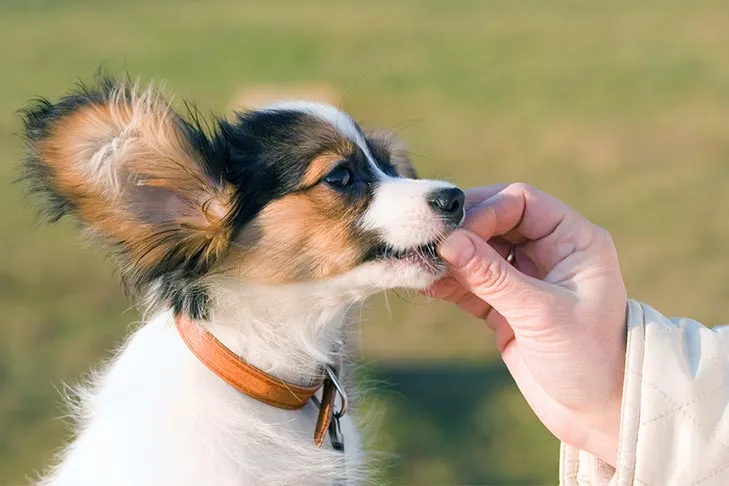Dogs can experience stomach troubles just like humans, from indigestion and diarrhea to excess gas. While serious or ongoing issues require immediate veterinary attention, mild cases of upset stomach or loose stools can often be managed at home using certain over-the-counter (OTC) human medications that are safe for dogs. Always consult your vet before giving any medication, especially if symptoms last more than a day or if your dog has pre-existing conditions. This guide covers proven options like Pepto-Bismol, Imodium, and Pepcid, drawing from expert advice by Dr. Jerry Klein, Chief Veterinary Officer at the American Kennel Club (AKC).
Understanding your dog’s gastrointestinal (GI) issues is key to safe treatment. Common causes include dietary indiscretion, stress, or parasites, but ruling out severe problems like parvo in puppies is essential. These OTC remedies provide symptomatic relief by coating the stomach lining, slowing motility, or reducing acid, helping restore balance without unnecessary trips to the clinic for minor episodes.
Pepto-Bismol for Dogs: Dosage and Precautions
Pepto-Bismol (bismuth subsalicylate) is one of the most commonly considered human meds for dog stomach upset. It’s technically safe in small doses and works by soothing irritation and killing some bacteria causing diarrhea. However, Dr. Klein cautions against routine use due to risks: the salicylates may trigger gastric bleeding, while bismuth can darken stools, hiding blood.
Veterinarians might prefer dog-specific alternatives like Corrective Suspension. Avoid it entirely in dogs with bleeding disorders, those pregnant or nursing, or on NSAIDs like Rimadyl or Deramaxx. If approved by your vet, the dosage is about 1 teaspoon per 10 pounds of body weight, given every 6-8 hours, up to two doses max. Stop if diarrhea persists and seek professional care.
To give it safely, use a needle-free syringe: squirt toward the back of the tongue, hold the mouth closed briefly, and encourage swallowing. This method minimizes mess and ensures absorption. Real-world experience from dog owners shows it helps with mild indigestion from scavenged food, but monitoring for side effects like vomiting is crucial.
Imodium: Effective for Dog Diarrhea Control
Imodium (loperamide) is another reliable OTC option for stopping diarrhea in dogs by slowing gut movement, allowing more water absorption. It’s widely used but not for every pup—check with your vet first, as it’s contraindicated in dogs with infections like parvovirus or those on certain meds.
 Papillon puppy gently taking a treat from a hand
Papillon puppy gently taking a treat from a hand
The standard dosage, per Dr. Klein, is one 2 mg tablet per 40 pounds of body weight, 2-3 times daily for no more than two days. For example, a 20-pound dog might get half a tablet twice a day. Hide it in a small amount of bland food like cheese or a pill pocket to mask the taste without overloading the stomach.
Owners report quick relief in stress-induced diarrhea, such as after boarding, but never use it for bloody stools or if your dog seems lethargic—these signal deeper issues needing vet intervention, possibly parvo K medicine.
Pepcid: Managing Acid-Related Stomach Problems
For dogs with excess stomach acid, gastric ulcers, or reflux, Pepcid (famotidine) is a go-to recommendation from vets, even though it’s not FDA-approved for pets. It reduces acid production effectively and is gentler than some alternatives.
Administer one 10 mg tablet per 20 pounds every 12-24 hours, ideally one hour before meals for best results. Stick to Original Strength tablets—avoid Complete or Maximum Strength versions with extras that could upset sensitive stomachs further. Give it directly: tilt the head back, place on the tongue’s back, and stroke the throat to prompt swallowing.
Supporting bland diets with unseasoned pumpkin or rice enhances recovery, as these soothe without irritating. Probiotics, sometimes human-grade ones prescribed by vets, can also aid gut flora restoration, showing results in 24 hours for non-severe cases.
Additional Tips for Home Management
Beyond meds, fasting for 12-24 hours followed by small, frequent meals of boiled chicken and rice helps many dogs rebound. Hydration is vital—encourage water intake or use electrolyte solutions. Track symptoms: frequency of stools, color, presence of blood or mucus.
For persistent issues, probiotics or vet-formulated upset stomach products provide natural support. Dr. Klein emphasizes experience: “Mild diarrhea often resolves quickly with these steps, but trust your instincts—if your dog acts off, get checked.”
Incorporate preventive habits like gradual diet changes and parasite control to minimize recurrences. Sites like AKC offer authoritative guidance backed by veterinary experts.
When to See a Vet and Final Thoughts
While these safe human medications offer quick relief for minor dog stomach upset, they’re not cures. Red flags include prolonged diarrhea (>48 hours), dehydration, vomiting, lethargy, or blood—head to the vet immediately, as they could indicate infections or blockages.
In summary, Pepto-Bismol, Imodium, and Pepcid can be lifesavers for everyday GI woes when used correctly under vet guidance. Prioritize your dog’s health with accurate dosing, close monitoring, and professional advice. Share your experiences in the comments, and explore more tips on home remedies for fleas and ticks or other dog care essentials!
References:
- American Kennel Club (AKC) expert advice by Dr. Jerry Klein.
- Product sites: Pepto-Bismol.com, Imodium.com, Pepcid.com.
